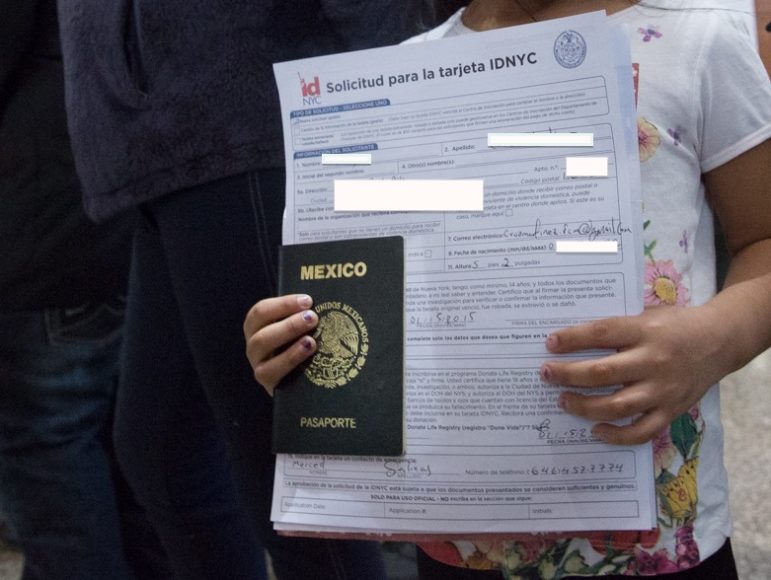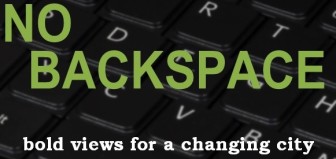
William Alatriste
An official City Council photo from early 2015 shows a young applicant for IDNYC. Her face, name and address are visible in the original.
The city is sweetening the pot to its IDNYC program by adding more free memberships to cultural hotspots. Following the presidential election, stories have highlighted potential risks the municipal identification program might impose on undocumented immigrants, the population the city steered the ID’s towards. Will Donald Trump’s regime, promising a few million new deportations, get the personal information of nearly 1 million New Yorkers who signed up in 2016? The city is promising to destroy the data but it appears key information, like names and addresses, won’t be destroyed–putting noncitizen card holders at risk.

No Backspace is City Limits’ blog featuring a recurring cast of opinion writers passionate about New York people, policies and politics. The views expressed here aren’t necessarily those of City Limits. Click here to read more.
The mayor and the City Council have doubled down and welcomed new applicants this year, essentially signaling there’s nothing to worry about. However, if you or someone you know is undocumented, you should worry. Not only have two Republican lawmakers from the Trump-voting borough of Staten Island sued (and prevailed in the early stages of the case) to keep the city from purging personal data in the city’s possession, like copies of passports, the “purge” isn’t really a purge. Since names, addresses and even photos will be kept by the city, a potential alley oop to immigration officials, who already launch raids in the city virtually unabated, is a real possibility.
Damage-control efforts, which include proclamations from the city that it will “defend and protect our immigrant brothers and sisters”, are too little too late considering that it was the city who put immigrants in jeopardy even though they were warned not to.
In 2014, as the city was patting itself on the back for IDNYC as well as legislative changes that promised to keep Immigration and Customs Enforcement (ICE) out of Rikers, there was a small group of dissenting voices. As City Limits reported yesterday, the New York Civil Liberties Union opposed the municipal identification program, noting that both local and federal law enforcement agencies could request cardholder’s personal information without probable cause and without the city even needing to notify the person that their info was being obtained. “In this bill, the city has not done enough to protect those documents from being used by law enforcement”, one of their spokespeople testified at the time.
Families for Freedom, an organization that works with families facing deportation, also didn’t support IDNYC even as more mainstream immigration advocacy groups, like the New York Immigration Coalition, did. Make The Road NY, for example, even signed up people in their offices. Abraham Paulos, executive director of Families, says his group was put off after learning that info was being stored and that the NYPD was intimately involved in crafting the legislation. He says he told the city that they were making a big mistake but they brushed off his concerns as paranoia. As a result of Trump’s election, one of his members relocated because of fear that his information could be used to track him after his participation with IDNYC and the Deferred Action for Childhood Arrivals (DACA) program.
Two years before the rise of Trump, Paulos says the document collection efforts of the program were a clear red flag. He notes that the Mayor’s Office of Immigrant Affairs told him that the retention of info was the police department’s idea, supposedly to combat fraud. “It was as if the city and the NYPD were saying that there was something inherently criminal about the city’s immigration population, as if they were more likely to commit fraud.” The fact that the city has now, in the 11th hour, decided to not store document data on new IDNYC applicants in 2017 perhaps proves that it was never actually crucial to the program other than to appease the police department.
Paulos says he told city lawmakers the risks. The appointment of law architect Kris Kobach, the architect of Arizona’s infamous anti-immigration SB1070 law, has Paulos worried that that IDNYC could prove a treasure trove for a deportation-minded administration.”For some people, this is games. This isn’t a game for our people. This is war. When ICE agents show up at your door at 5 o’clock in the morning armed with guns, this isn’t a game.”
New York City is supposed to be a “sanctuary city” according to city lawmakers, some of whom have courageously held rallies in front of Trump Tower since the November election despite barely offering more than a peep about outgoing president Barack Obama, who deported more undocumented immigrants than any U.S. president in history. But simply bashing the Trump piñata doesn’t make for good governance.
Take the fact that the city still clings to Broken Windows policing, the aggressive enforcement of low-level offenses, which exponentially raises the risks to undocumented people every single day. City Council Speaker Melissa Mark-Viverito has countered that criticism by insisting that sanctuary laws prevent cops from asking about immigration status during encounters. However, a group of legal organizations last month pointed out to Mark-Viverito that federal law requires fingerprint records taken by the NYPD, like during low-level arrests, be sent to immigrations officials regardless of the city’s laws. Paulos adds that even without formal collaboration between police and ICE, immigration officials find undocumented people at their publicly available court dates. Nationally, most people deported under deporter-in-chief Obama had either committed minor infractions or had no criminal history at all.
The IDNYC fiasco adds to that fire.
“People were better off before IDNYC,” Paulos says. “The people who supported IDNYC basically told undocumented people that they should trust the government,” he says. “We don’t need museum passes and discounts, we need real protections.” While nearly every elected official in the city, including Councilmembers like Menchaca, Viverito and Daniel Dromm, lined up to support the municipal ID program, few thought to actually protect immigrants. Their actions now prove either negligent or foolish. The egg they all have on their faces slides down to the advocacy groups that supported the idea that it was okay to register vulnerable people with the government. That they all supported the document-collection efforts to appease the NYPD (which apparently now has no problem with not keeping documents, as per the new IDNYC policy), shows that there are some immigration groups who are deferential to the city at the expense of being vigilant.
Whether IDNYC was devised as a genuine resource for immigrants, a cheap political progressive kumbaya moment or some combination of both, the fact is that undocumented people were burned by trusting city government and now face uncertainty. As the son of a formerly undocumented Colombian immigrant, I can tell you that the worst feeling for noncitizens is the sense of being exposed.
Worst of all, the de Blasio administration continues, irresponsibly, to encourage people to sign up. They should stop and scrap the program altogether. Theoretically, an anti-immigrant mayor could be elected in 2017 or 2021 who could choose to cooperate fully with a Trump White House. Though not every IDNYC card holder is undocumented, the city has perhaps created an immigrant registry that could be susceptible to unforecastable political winds. Even if bleeding-heart liberal citizens chose to join IDNYC en masse to try to throw off immigration officials, as some have suggested, that would only amount to a “stall tactic”, Paulos explains. “They’ll still be able to look through the list, find Hispanic or foreign sounding names and maybe start showing up at people’s doors.” And the risk isn’t only limited to those in the program, but also to their immediate family members, who may live with them.
With Trumpmageddon looming, undocumented immigrants may have very learned the hard way that government, whether local or federal, liberal or conservative, may never be able provide them a true sanctuary.









3 thoughts on “No BackSpace: IDNYC Fiasco Shows Undocumented Immigrants Can’t Trust the City”
Do not sleep on Josmar, he is consistently clear and correct.
Although this one was obvious. And do not think the feds do not already have all the info on all card holders complements of NYPD Spying.
Pingback: Pizza delivery man who agreed to self-deport under Obama at center of new deportation drama – The Alt Standard
Pingback: Pizza delivery man who agreed to self-deport under Obama at center of new deportation drama - Novus Vero